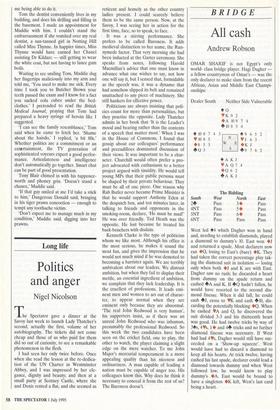Long life
Politics and anger
Nigel Nicolson
The Spectator gave a dinner at the Savoy last week to launch Lady Thatcher's second, actually the first, volume of her autobiography. The tickets did not come cheap and those of us who paid for them did so out of curiosity, to see a remarkable phenomenon in the flesh.
I had seen her only twice before. Once when she read the lesson at the re-dedica- tion of the UN Charter in Westminster Abbey, and I was impressed by her ele- gance, dignity and beauty; and then at a small party at Scotney Castle, where she and Denis rented a flat, and she seemed as reticent and homely as the other country ladies present. I could scarcely believe them to be the same person. Now, at the Savoy, I was seeing her in action for the first time, face, so to speak, to face.
It was a stirring performance. She prefers to be called Baroness. It adds medieval distinction to her name, the Run- nymede factor. That very morning she had been inducted at the Garter ceremony. She speaks from notes, following Harold Macmillan's advice that one must know in advance what one wishes to say, not how one will say it, but I sensed that, formidable as the speech was, it was a dynamo that had somehow slipped its belt and remained unattached to any piece of machinery. She still hankers for effective power.
Politicians are always insisting that poli- cies count for more than personalities, but they practise the opposite. Lady Thatcher admits in her book that 'It is the Leader's mood and bearing rather than the contents of a speech that matter most.' When I was in the House of Commons, I found that gossip about our colleagues' performance and peccadilloes dominated discussion of their views. It was important to be a char- acter. Churchill would often prefer a pro- ject advocated with enthusiasm to a better project argued with timidity. He would tell young MPs that their public persona must be shaped by their private behaviour. They must be all of one piece. One reason why Rab Butler never became Prime Minister is that he would support Anthony Eden at the despatch box, and ten minutes later, in talking to friends and opponents in the smoking-room, declare, 'He must be mad!' He was over friendly. Ted Heath was the opposite. He lost because he treated his back-benchers with disdain.
Kenneth Clarke is the type of politician whom we like most. Although his office is the most serious, he makes it sound the most fun, and gives the impression that he would not much mind if he was demoted to becoming a barrister again. We are terribly ambivalent about our leaders. We distrust ambition, but when they fail to display their mettle, an essential ingredient of ambition, we complain that they lack leadership. It is the cruellest of professions. It leads emi- nent men and women to act out of charac- ter, to appear normal when they are eminent only because they are abnormal. `The real John Redwood is very human', his supporters insist, as if there was an unreal John Redwood who was inhuman, presumably the professional Redwood. So this week the two candidates have been seen on the cricket field, one to play, the other to watch, the player claiming a slight edge on the mere watcher. To me John Major's mercurial temperament is a more appealing quality than his niceness and ordinariness. A man capable of leading a nation must be capable of anger too. His colleagues know this. Why does he think it necessary to conceal it from the rest of us? The Baroness doesn't.


































































 Previous page
Previous page